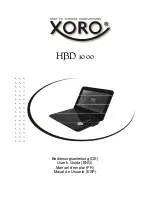
Circuit Descriptions, List of Abbreviations, and IC Data Sheets
EN 49
SD-5.31SL
9.
DVD Front-End Processor
Figure 9-4 Block diagram.
The ALI M5705 includes:
•
An embedded micro controller.
•
A DVD-decoder.
•
A CD/CD-ROM decoder.
•
A RAM buffer interface.
•
An ATAPI interface.
•
A data channel.
•
A digital servo controller.
The M5705 can support up to 32-speed CD-ROM and 6-speed
DVD-ROM systems. It can playback not only the standard
format of DVD-ROM and DVD-R disk, but also all the various
CD-ROM disk types such as CD-DA, VCD, CDI, Photo CD,
Karaoke CD, CD-plus, Enhanced CD, CD-R, etc.
Together with the SP3721A RF signal processor, an audio
DAC, a RAM buffer, and motor drivers, the M5705 is configured
as a CD/DVD-ROM system. It also integrates MPEG-2
interface (or so-called local bus) and has an ATAPI based
interface bus.
The M5705’s digital servo implements the focus, tracking,
sledge and spindle servo loop. It also provides an auto-
adjustment method for adjustment-free CD/DVD systems. It
also provides a stable layer jump solution for reading data from
dual layer DVD discs. This feature makes the playback go
smoothly at the point of layer change.
The M5705 includes an embedded micro controller, which is
compatible with Intel 8032. It also supports an automatic
system firmware download function for upgrading the system
firmware directly from ATA interface or CD-R discs recorded
with new version firmware.
The ATA interface can transfers data in Programmed I/O (PIO)
mode. The local bus signals for directly connecting to an MPEG
decoder share the pins with ATA interface.
Features M5705
•
Data Separator
–
Built-in data slicer and data PLL for data recovery from
RF signal.
–
Supports digital/analogue slice level adjustment.
–
Built-in auto calibration function.
–
Built-in auto wire range control function.
•
DVD-DSP
–
Built-in synchronous pattern/ID detection /protection/
separation.
–
Built-in EFM+ (8 to 16) demodulation circuit.
–
n Built-in high performance RSPC ECC circuit.
–
Supports up to 6X DVD-ROM system with ECC
correcting “on the fly”.
–
Built-in descrambler/EDC circuit.
•
CD-DSP
–
Synchronous pattern detection, protection, and
interpolation.
–
Built-in EFM demodulation circuit, subcode
demodulation circuit.
•
Digital Servo
–
Built-in A/D and D/A converters for servo control
signals processing.
–
Built-in digital controller for focus, tracking servo
control of CD/DVD systems.
–
Built-in CLV/CAV auxiliary function for spindle servo
control.
–
Built-in “Seek Sensor” auxiliary circuit for seek control.
–
Automatic adjustment of focus servo and tracking
servo, for loop gain, offset and balance.
–
Built-in RF-gain automatic adjustment function.
–
Built-in AFC circuit and APC circuit for CLV and AFC
circuit for CAV spindle servo of CD/DVD systems.
–
Built-in defect and shock protection function.
•
DRAM Interface
–
Supports up to 16 Mb EDO DRAM and SDRAM.
–
Separate buffer address pointers and automatic
address calculation that save firmware effort.
–
Read-ahead cache scheme for multimedia
isochronous transfer.
–
Protection logic preventing uncorrected sectors being
released to the host.
Memory
A 512 KB EDO-DRAM (item 7201) is used as a data buffer and
error correction for ATAPI.
A 2 Mb flash memory (item 7202) is used to store the front-end
software, used by the ALI M5705 front-end controller. Since
actual addressable space is 1 Mb, the MSB address pin of this
memory is jumpered to "low".
9.3.2
Interface
The interface between front-end and back-end is done via an
ATAPI interface.
First, a little about the acronyms. IDE and ATA are
synonymous. ATA is short for AT-attachment, referring to the
original IBM AT computer. IDE stands for Integrated Drive
Electronics. The ATA acronym is preferred today over IDE.
Why is it called AT-attached? The signals on the 40-pin ATA
ribbon cable follow the timings and constraints of the ISA
system bus on the IBM PC AT. ATAPI stands for AT
Attachment Packet Interface (ATAPI).
Hosts control ATAPI devices are using SCSI (Small Computer
System Interface) command packets. The SCSI command
packets are transported over the ATA interface, instead of the
parallel SCSI bus (ATA/ATAPI-6).
Different devices accept different sets of SCSI command
packets. There are some differences in command packet
format between ATAPI and SCSI. Mostly, these are
simplifications, i.e. features are missing in ATAPI that would
appear on a SCSI device. There are some areas, though,
where ATAPI defined new commands and responses.
IDE and ATA are, as mentioned earlier, one and the same
thing: a disk drive implementation designed to integrate the
controller onto the drive itself, thereby reducing interface costs,
and making firmware implementations easier.
One of the disadvantages of ATA is that it was designed for
hard disks only. That was fine back when a high end PC
shipped with just a floppy drive and a 40 MB hard disk, but
today CD-ROM and tape drives are commonplace devices that
should preferably run off a single low-cost interface. The ATA
Packet Interface (ATAPI) is a standard designed for devices
such as CD-ROMs and tape drives that plug into an ordinary
ATA (IDE) port.
9.3.3
Back-end: the Digital Part
The back-end consists of:
•
DVD back-end processor
•
External memory
•
Audio output
•
Video output
M
RF
Amp
Motor
drivers
Data
Separator
DVD-DSP
RAM
Arbiter
ATAPI
&
MPEG
I/F
C3 ECC
EDC
Digital
Servo
CD-DSP
Target
Search
MCU
ROM
MPEG
DEC.
512KB DRAM
CL 36532043_002.eps
020603
7202
7101
7100
7002
7200
7201
















































